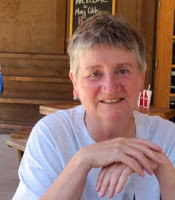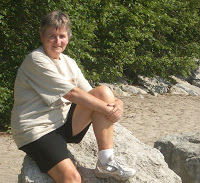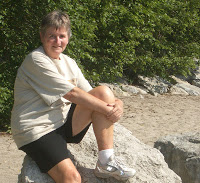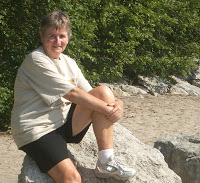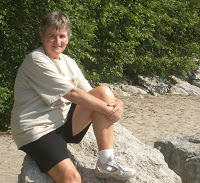writing is based on life, and I don’t know what else we’d base it on, then
surely it must be experimental because all life is experimental. And not just
human life; what is evolution, after all, but a series of experiments? Trouble
is, real life experiments can be painful; just think of all those critters who
ended up on the wrong side of the evolutionary experiments.
Extinct!
and I read, somewhere, in some pop-psych book, that we should all look at life
as an experiment and therefor lighten up. Rather than castigating myself for
moving back to Podunk, Iowa, and consequently being miserable and wanting
nothing more than to return to Denver, what a stupid mistake, why did you do
such a stupid thing, etc. etc., I should shrug and say, ”Oh well, just an
experiment. Rather surprising results; not quite what I expected.”
move happily back to Denver. We both rather liked the concept. Putting yourself
down because you made a dumb mistake, a bad decision, resolves nothing. It was
an experiment. You cannot fail an experiment. The result just is, and
you go from there.
problem is, even though you perhaps are free from beating up on yourself, that
experiment was darned expensive: financially and emotionally. Often for others
as well as yourself. Your girlfriend was devastated that you didn’t care enough
to stick around. On the other hand, neither did she care enough to go with you.
Relationship over. You sold the condo that you so enjoyed. And now, by some
quirk of fate, it seems to require twice as much money as you sold it for, to
buy anything remotely equivalent. That move to Podunk has cost you a bundle,
regardless of whether you call it an experiment or a stupid mistake.
the other hand, in defense of experiments, there are indeed many situations
which might well be improved by being seen as experimental. The one that leaps
into my mind, is marriage. What else can it be? Two kids barely out of school
promise to love and be faithful to each other for what may well be the next
seventy years. How intimidating is that? How realistic is it? Clearly not very,
given our less than 50% success rate. Wouldn’t it make a whole lot more sense
to promise to give this experiment your very best shot, and see what happens.
How much lighter, less intimidating, that would feel. Perhaps under such
circumstances, marriages would actually have a better chance of survival. That
institution needs a shot in the arm. I say we try it. Life truly is a
continuous series of experiments. We might as well face it.
But writing, now, that really is free, except for my time. And harmless.
Spending three hours, or three months if it comes to that, writing something
which eventually falls victim to the delete key, is probably just as
beneficial to me as that which triumphantly ends up at the print
command. The process is as valuable as the end result. It’s all a series of
experiments which result in a string of surprises.
I sit down at the keyboard with a firm plan in place. I know how I’m going to
start, where I meander to from there, and how it will end. All I have to do is
put down the words and that, for me, is usually the easy part. Other times I
place my fingers on the keys and my mind is a complete blank. I haven’t managed
to form one thought about the topic on which I plan to write. I flex my fingers
as if preparing to play the piano, and wait for the music to start. From this
point on, whether I have a clear plan in my head or no thoughts at all,
everything comes a surprise. Who knows where this experiment will lead?
fingers start to move; slowly at first, then faster. The cymbals clash. A
crashing crescendo. Silence falls. I look back to see what I have actually
written. It’s fantastic! I love it! It’s godawful. It’s crap! Most often it’s
somewhere in between. What’s that whole paragraph about? Delete. Need to
explain this better. Insert. That word isn’t just, quite, exactly,
right. A gentle man. No. A quiet man? No. A calm man. Calm. That’s the word I’m
looking for. And, in finding the right word, I see him differently. A
wonderful, totally unexpected, result of this experiment.
from the grand design to every single individual word or even punctuation, is
all an experiment; trial and error. I rarely, even on occasions when I have a
complete plan, end up where I intended. Well! I sit back and re-read what I
wrote. Who’da thunk? I ask myself. Who knew I thought that? Apparently my
fingers did. They are the ones who seem to know where we’re going. Not me. I
just evaluate and tweak it when they’re done.
topic we have chosen to write about is an experiment in itself. Some I look on
with approval. I know exactly how to approach that. Others I stare at
blankly and want to strangle whoever dreamed that one up. But in reality, some
of the topics I can’t seem to raise any interest in generate what I judge as
good stories; some of the topics I love end up somewhere in the mediocre.
while back I read a novel, can’t of course recall either the title or the
author, which was honestly kinda boring. It was long and moved slowly, but I
persevered. You know how it is sometimes with a book like that? You have to
finish it because it really can’t be as bad as you think it is and eventually
you’ll get it. Sometimes you don’t, and you wonder how the thing ever got
published. But this one had such a twist in the tail, or tale, that I still
remember it and in spite of a good deal of boredom to be suffered I would
recommend it. If I could remember what it was, that is! The point is, I found
myself wondering about the author’s process in this particular experiment. Did
she (yes, I do recall it was a woman) plan it that way all along. The reader
must plod on through this rather uninviting story, being set up, really,
for the dramatic shocker at the end, making the effort worthwhile after all? Or
did she get towards the end of her writing and have to accept that in all
honesty it was pretty boring. Who would read it? It would get bad reviews. It
would end up being sold for 10% of it’s original price, on Amazon, amongst all
the other dismal failures. And she was clever enough to dream up a way to save
it with the surprise ending?
have been written about how famous writers planned their work, from the
intricacies of James Joyce to the ball-point scrawls of Rowling, to Faulkner,
who famously outlined his
bourbon. But I would be willing to bet, no matter how well established and
researched the plan, every day of writing brought with it a myriad of surprises
and adjustments. Writing, like any artistic creation, is an experiment whether
you’re at the very top of the game or a rank amateur, just struggling to put
one word in front of another.
was born and raised in England. After graduation from college there, I moved to
the U.S. and, having discovered Colorado, never left. I have lived in the
Denver-Boulder area since 1965, working for 30 years at IBM. I married, raised
four stepchildren, then got divorced after finally, in my forties, accepting
myself as a lesbian. I have been with
my wonderful partner Betsy for thirty years. We have been married since 2013.

